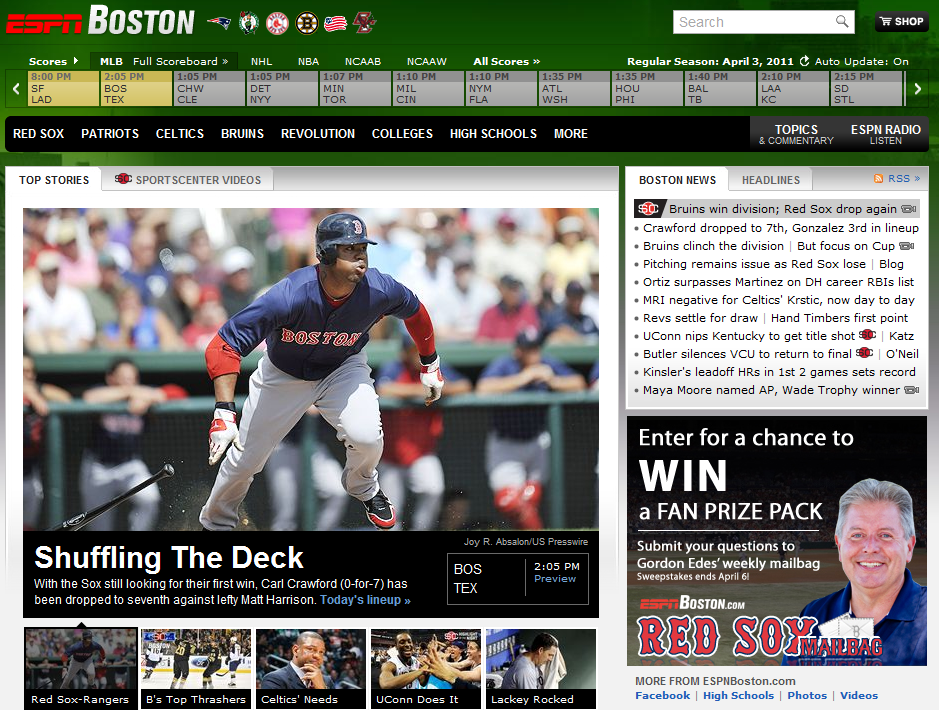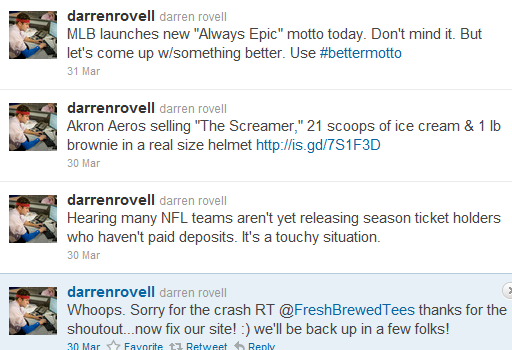Whether you are a sports fan or work in media, Mark Cuban's "Does ESPN.com have a Twitter problem?" is a relevant, good read. Cuban argues that ESPN is struggling with social media because their writers generally do not have big followings and the company hasn't figured out how to effectively monetize the platform (like most publishers, monetization is through traffic referrals). I will offer three follow up points that are specifically aimed at ESPN but relevant for any content publisher.
In short, ESPN does not have a Twitter problem. Like all other media networks, they have a Twitter opportunity. ESPN has a tremendous brand, a powerful promotional platform, and 100s of great personalities who can together leverage social media to enhance the ESPN.com experience. Here are three ways to get there:
1. Solve Finding & Promotion.
The primary problem is that big publishing networks like ESPN have big networks of writers / personalities. That creates a serious problem in finding and following the relevant personalities.
I am a paying ESPN Insider Subscriber. ESPN knows explicitly and implicitly that I like the Red Sox, Patriots, and Celtics - and I visit ESPN Boston. But this the ESPN Boston homepage and there is no promotion (let alone mention) of the writers I should follow on Twitter / Facebook. I should be able to subscribe instantly to all related writers.

Other ideas:
- ESPN.com/twitter should list out Twitter handles by popularity, team, relevance, etc - ESPN personalities should have Twitter pages that promote other personalities and/or ESPN.com/twitter - ESPN should build and promote Twitter lists - Articles on ESPN should promote writer's Twitter handles (this would be a good example of In the River marketing right?)

2. Ensure an On-brand Voice (not uniform - But on-brand).
A couple things to get out the way: - we are following these writers primarily because of their expertise... that is because: - there are very few personalities like Bill Simmons - therefore, there is a difference between their professional and personal Twitter accounts (or habits)
So publishing networks who promote their writers should ensure a consistent voice. This does NOT mean that ESPN writers should all engage similarly (Bill Simmons and Buster Olney are both great and very, very different). But it does mean that ESPN should make sure that their personalities are engaging appropriately and on-brand on Twitter.... just as they do within ESPN.com articles.
For every Buster Olney, Colin Cowherd, and Bill Simmons - there is a Jemele Hill. Here Twitter description is: "Jemele Hill is an ESPN columnist and television analyst. I tweet a lot. If you don't like it, keep it to yourself! ". Now Jemele may be a great reporter and sports thinker, but she is annoying on Twitter (sorry). She often posts dozens of times an hour on subjects irrelevant to sports and ESPN. But she has 40,000+ followers and affects how we think about ESPN (and their writers') roles in social media.
Give me more Buster Olneys to follow. I'll appreciate the writers more. I'll visit ESPN more. And I'll appreciate the brand more.
3. Engage with Fans & Follow Social Media Best-Practices.
This is simple: engaging in social media has to be more than just linking to an article. Twitter and Facebook represent opportunities to behave in ways that traditional media doesn't afford. For instance:
- real-time commentary - commentary beyond the article or in-response to reactions - engaging with readers and fans: questions, comments, responses, etc. - provide behind-the-scenes access that is better suited for Twitter than an article - cross promote other content, writers, etc
Darren Rovell of Sports Biz on CNBC is great at this. Here are a few examples:


